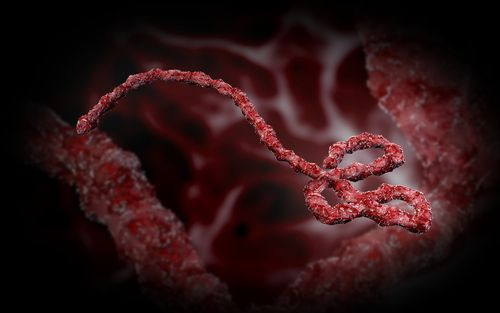In Ebola Cure Search, Doctors Expose Virus's Deadly Anti-Immune Weapons; Protein Disables Humans' Natural Anti-Virus

The Ebola virus kills humans so effectively — nine out of 10 infected people die — because it carries a protein designed to disarm the body's natural defenses, scientists said Wednesday in a paper describing the mechanism.
They said the research could aid the urgent search for a cure to the viral outbreak that surpassed 1,000 victims this week. "We've known for a long time that infection with Ebola obstructs an important immune compound called interferon," said co-author Dr. Gaya Amarasinghe, of the Washington University School of Medicine, in a statement. "Now we know how Ebola does this, and that can guide the development of new treatments." The research, led by doctors in the United States, appears in the journal Cell Host & Microbe.
Ebola's weaponry is highly sophisticated. It creates a protein called VP24 that sabotages the human cells' ability to transport proteins called interferons. Interferons are like sentinels that warn the nucleus about bacterial or viral invasions. The DNA stored in the nucleus then begins ordering the production of immune proteins.
Normally, these interferons have quick access to the cell nucleus through what the researchers likened to "emergency access lanes." Once they deliver their genetic message to the nucleus, the DNA can rally the protein infantry for the body's counter strike. But VP24 is clever; it blocks the interferons, rendering people helpless.
If scientists can devise a medicine to disarm Ebola of VP24, they can give people's bodies a fighting chance. "One of the key reasons that Ebola virus is so deadly is because it disrupts the body's immune response to the infection," said Dr. Chris Basler, of the Icahn School of Medicine at Mount Sinai, in the statement. "Figuring out how VP24 promotes this disruption will suggest new ways to defeat the virus."
Source: Xu W, et al. Ebola Virus VP24 Targets a Unique NLS Binding Site on Karyopherin Alpha 5 to Selectively Compete with Nuclear Import of Phosphorylated STAT1. Cell Host & Microbe. 2014.



























